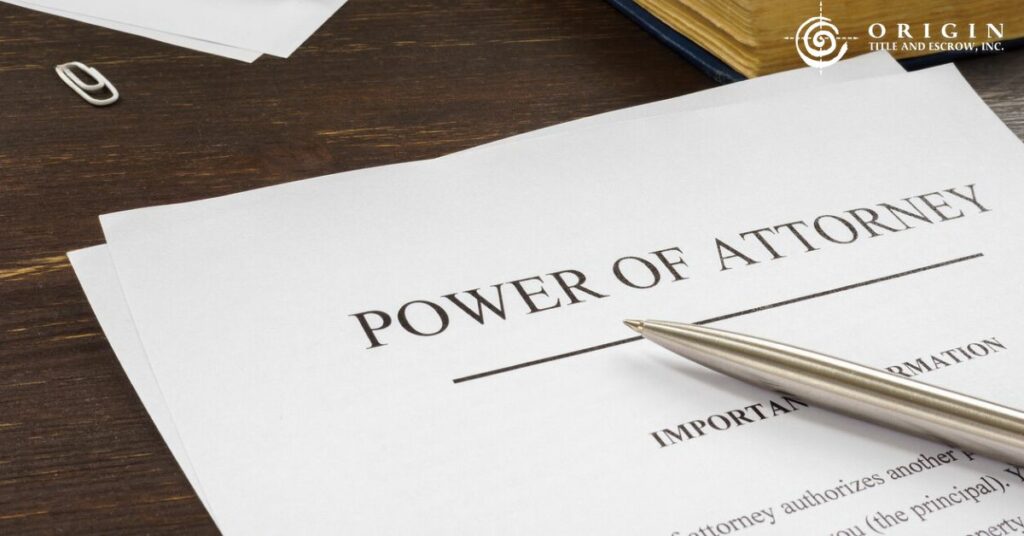Closing Attorney
Power of Attorney Use
A Power of Attorney (POA) is a legal agreement which allows one person (the ‘agent’) to sign documents on behalf of another person (the ‘principal’). POA’s are a great option in some circumstances but should be used because one party simply does not want to come to closing. Closing attorneys need to balance accommodating the parties with protecting against fraud.
Using a power of attorney creates additional risk in the transaction because one person is being given legal rights to sign documents for another. If there is no reason for the additional risk, a POA should not be used. A POA should not be used merely for convenience.
There are times when an owner, buyer, or seller, will not be available at a real estate closing. For example, a person may be out of the country or physically unable to sign for themselves. Using a POA is usually much easier than trying to get closing documents signed in another country.
Most of the time, a specific Power of Attorney is used to indicate that the principal approved the terms of the transaction. This lowers the risk as much as possible by keeping such powers very limited.
Each lender will have very specific requirements to approve a POA. Some loan programs will not allow them at all. If a POA is being used in a transaction involving a loan, it is best to check with the lender for approval.
Another general rule for POAs is that the agent may not convey the property to themselves. This is self-serving, increases risk in the transaction, and creates a title issue.
A general Power of Attorney may be approved on a case-by-case basis, but is avoided whenever possible. Georgia does have a statutory form that is accepted in most situations. Any attorney or lender accepting the POA will likely confirm with the principal.
It may appear easier to use a POA in some cases, but using a POA out of convenience increases costs, creates unnecessary risk, and the person signing may not be happy with you once they see they have to write out “your name, by agent’s name, as attorney in fact” on each signature line.
John C. Bennett is a real estate closing attorney and owner of Origin Title and Escrow, Inc..
Since 2003, Origin Title has handled real estate transactions – purchases, refinances, reverse
mortgages – quickly and professionally. There will be no surprises, nothing misunderstood. Title
searches are thorough and well-reasoned, to avoid unpleasant surprises later down the road.
Calculate your closing costs in Georgia or Florida using our calculator or contact Origin Title.
Mobile Closings
Buying a new home is exciting, but no one really enjoys coming to an attorney’s office to sign documents. It’s not convenient, and you often have to sit in a waiting room for a long time.
Origin Title and Escrow makes it easy to sign closing documents by sending an attorney to the borrower’s home or office.
Georgia does not have a remote notary law yet, so many real estate closing documents must still be signed with ink on paper, with a notary and witness physically present.
The attorney is not simply witnessing and notarizing the closing documents, but will be answering questions and handling the full closing process from beginning to end. When done correctly, mobile closings are fantastic at making closing on a loan convenient.
We have been doing mobile closings since 2004. For refinances, we drive to a borrower’s home or office.
Mobile closings are much easier for a primary residence refinance because there is a three-day right of rescission before funding the loan, which gives us time to send everything back to the lender.
It is more difficult to do a mobile closing with investment refinances or purchase closings because sending wires and cutting checks cannot be done remotely. We often are required to send signed closing documents to get funding approval from the lender.
Mobile closings are fine and legal if there is an attorney present at signing, and the full closing process is being handled by a duly licensed Georgia Attorney. ‘Witness Only Closings’ are prohibited, where the only participation of an attorney is simply getting the closing documents signed.
Origin Title and Escrow handles the closing process all the way from title search, signing, funding, title insurance, and filing documents. For mobile closings, we send one of our attorneys to review the documents and get the documents signed. Having a notary go out by themselves to get closing documents signed is unethical and violates the Georgia Rules of Professional Conduct.
The Supreme Court of Georgia Formal Advisory Opinion 86-5 states that the closing of a real estate transaction constitutes the practice of law. Rule 5.5(a) of the Georgia Rules of Professional Conduct, (Known as Standard 24 prior to January 1, 2001) states that “A lawyer shall not practice law in a jurisdiction in violation of the regulation of the legal profession in that jurisdiction, or assist another in doing so.” Formal Advisory Opinion 86-5 was addressing paralegals handling the signing of closing documents for attorneys, but this rule would apply to anyone who is not a lawyer.
Formal Advisory Opinion Number 00-3 states that the Georgia Rules of Professional Conduct are not met if the attorney is only available via telephone when signing and reviewing closing documents.
The Opinion further states “The lawyer’s physical presence at a closing will assure that there is supervision of the work of a paralegal which is direct and constant.” A notary or a paralegal may not, by themselves, conduct the signing part of a closing. A duly licensed Georgia attorney must be present at the signing.
Attorneys may delegate certain tasks to paralegals but may not delegate the signing of closing documents to a paralegal or mobile notary, even when the attorney is available by telephone. Mobile closings are great for borrowers, but this may not be completed by a notary without an attorney present at the signing.
Advisory Opinion 2003-2 clarified that it would be ethically improper “for a lawyer to ‘delegate to a nonlawyer the responsibility to ‘close’ the real estate transaction without the participation of an attorney’”. This opinion further states that “one who facilitates the execution of a deed of conveyance on behalf of another within the state of Georgia is engaged in the practice of law. One does not become licensed to practice law simply by procuring a notary seal.” Refinances and other closings involving real estate are subject to the same rules as a purchase closing.
In Georgia, the full closing process must be handled by a duly licensed Georgia attorney. This requirement is not met when a notary facilitates the signing of the closing documents, or when a Georgia attorney does nothing more than witness the signing of closing documents. The unauthorized practice of law is a crime in Georgia punishable by a fine not to exceed $1,000 and a year in jail (O.C.G.A. § 15-19-56).
These rules were temporarily stayed during the state of emergency as a result of the COVID-19 pandemic in 2020 to allow an attorney, notary, and witness to be “present” at a closing via video conferencing software. Video closings stopped once the state of emergency was lifted.
These rules may be altered in the future, but for now, a duly licensed Georgia attorney must be present at the signing of real estate closing documents, even if you are signing at your home.
John C. Bennett is a real estate closing attorney and owner of Origin Title and Escrow, Inc.. Since 2003, Origin Title has handled real estate transactions – purchases, refinances, reverse mortgages – quickly and professionally. There will be no surprises, nothing misunderstood. Title searches are thorough and well-reasoned, to avoid unpleasant surprises later down the road. Calculate your closing costs in Georgia or Florida using our calculator or contact Origin Title using this form.
Junk Fees Revisited
One of the many ways closing attorneys increase their fees is by passing costs on to buyers and sellers for incidental costs of doing business, such as copying, recording, overnight mailing, or banking services. When quoting their closing costs, many attorneys omit these items, so they come as a surprise right before closing.
Some added costs are reasonable if needed to accommodate a buyer or seller, depending on the situation. Drafting and recording a Power of Attorney will be an extra cost, for example. Overnighting lien payoff checks or tax payments due the next day will incur extra costs. Some attorneys need to collect money to cover the fees they pay to their bank.
Banks do charge for wires, but usually no more than $30. Attorneys pass this cost on to buyers and sellers. Some attorneys increase the fee to $50 or $75 to collect extra money from the closing. Wires are quicker and safer than handing out large checks to sellers or sending payoffs.
The same thing happens for e-recording services, scanning services, wire confirmation, reconciliation services, and so on. These services are very helpful and they save the attorneys a lot of time. In addition to saving time, many attorneys use these fee charges to increase their own revenue. Charging a client $75 for a wire is not ethical when the bank charge is $25. Disbursing funds to the seller is part of the settlement fee and should not have an additional cost.
Make sure any quote you get from a closing attorney includes everything. It’s not less expensive if the settlement fee is $300, but you have to pay to use the pens, receive funds, for the attorney’s reconciliation services or wire verifications, or to receive copies of anything.
John C. Bennett is a real estate closing attorney and owner of Origin Title and Escrow, Inc.. Since 2003, Origin Title has handled real estate transactions – purchases, refinances, reverse mortgages – quickly and professionally. There will be no surprises, nothing misunderstood. Title searches are thorough and well-reasoned, to avoid unpleasant surprises later down the road. Calculate your closing costs in Georgia or Florida using our calculator or contact Origin Title using this form.
What Does a Closing Attorney Do?
The general public may not know exactly how real estate is sold in the United States.
When you sell a car, you have a piece of paper called a Title, which is a document of ownership that is registered with the state that gets signed over to the buyer.
In the sale of real estate, there is no one Title document that gets passed to the buyer.
The closing attorney prepares a new Limited Warranty Deed for the sale, which is signed by the seller. The Limited Warranty Deed states that the seller has full ownership of the property and the authority to transfer it to the buyer.
That deed is then recorded in the deed records at the courthouse in the county where the property is located. Each time there is a sale of the property, a new deed is recorded for its transfer and sale.
John C. Bennett is a real estate closing attorney and owner of Origin Title and Escrow, Inc.. Since 2003, Origin Title has handled real estate transactions – purchases, refinances, reverse mortgages – quickly and professionally. There will be no surprises, nothing misunderstood. Title searches are thorough and well-reasoned, to avoid unpleasant surprises later down the road. Calculate your closing costs in Georgia or Florida using our calculator or contact Origin Title using this form.
How Often Are There Problems with Title?
We fix issues with the title about 25% of the time. The most common title issues are un-released mortgages, possible liens because the borrower has a common name, and mistakes in the legal description. All of these can be corrected.
The un-released mortgage is often a home equity line of credit with a zero balance. Homeowners pay it in full and think that because it is paid, it is closed. Even when a line of credit is paid in full, it remains open until the borrower sends written instructions to close the line of credit. Many people forget to do this. This is not a difficult problem to fix if you have time to find the loan account number and contact the lender.
Origin Title starts the title search as soon as we receive the title order and sales contract. We know there might be issues, and we can usually fix them without impacting the closing date, if we start right away.
Time is of the essence in real estate. We move quickly but with care to make sure title issues are corrected.
____
John C. Bennett is a real estate closing attorney and owner of Origin Title and Escrow, Inc.. Since 2003, Origin Title has handled real estate transactions – purchases, refinances, reverse mortgages – quickly and professionally. There will be no surprises, nothing misunderstood. Title searches are thorough and well-reasoned, to avoid unpleasant surprises later down the road. Calculate your closing costs in Georgia or Florida using our calculator or contact Origin Title using this form.
An Unclear Title
On about half of the closings we perform, there is a need to clear up some kind of title issue. If a title is not cleared, the lender or buyer may decide not to close on the property.
Common problems include judgments, liens and bankruptcies that are discovered as we look back over 50 years of records. We may find surprise deeds, trusts, wills, divorce decrees, forged signatures, sometimes one spouse fraudulently signing the others’ name without their knowledge, inheriting without knowing that some long-lost relative also has a claim, court judgments and tax situations. There may be a fictitious name or an adopted name on the deed instead of the legal name that needs to be verified.
There can be errors in the legal description, especially regarding easements and rights of access that could require a property survey.
Often, though, these are issues that can be resolved with just a little bit of effort. Sometimes it is just an error in the records themselves.
One common example is a property tax lien that has been paid but not released. Even though the lien may have been fully paid, some municipalities such as the Fulton County, do not release a tax lien unless they are specifically requested to do so.
Closing attorneys may charge for this additional service to clear a title, although it only takes a couple of minutes to email to request the release be filed. Origin Title does not charge extra for such simple services.
Once the search is complete and all title problems have been resolved then the closing can take place as planned and the Owner’s and Lender’s Title Insurance policies can be issued to protect their respective interests.
When Is a Closing Attorney Selected?
In Georgia, the closing attorney represents the lender that provides the loan, (or the Buyer in an all cash transaction), but the BUYER names the closing attorney in the sales agreement. The closing attorney’s role is significant, as they ensure all parties understand the complexities of the real estate closing process.
As the buyer, you have the option to select the closing attorney. You have the opportunity to find someone who specializes exclusively in real estate, one who is transparent about the fees they charge, and one who makes it clear they will answer every question and use as much time as it takes to be sure the buyer feels comfortable with the process and the outcome.
A closing attorney is required in Georgia when it comes to real estate closings. When you are ready to purchase a home, make sure you have your closing attorney selected before you make that first offer.
Importance of Selecting an Independent Closing Attorney
It is important to select an independent closing attorney for many reasons. We believe one of the top reasons is integrity. When putting a house under contract, an Affiliated Business Arrangement is a document stating that there is a business relationship involving the sharing of profits by a settlement service provider to another affiliated business. Origin Title does not participate in these because we see them as a conflict of interest. Affiliated Business Arrangements do nothing but raise the overall closing costs for the buyer and seller.
As you work with your agent to submit an offer on a home, if you are encouraged to use a particular closing attorney, ask if they are affiliated with the real estate office. If they say yes, consider doing more research and choosing an independent closing attorney. The best real estate agents select a closing attorney because they are good, not because the broker gets paid more.








